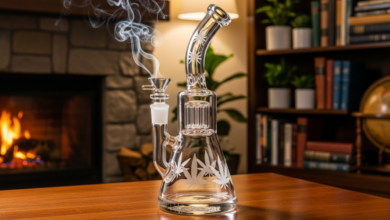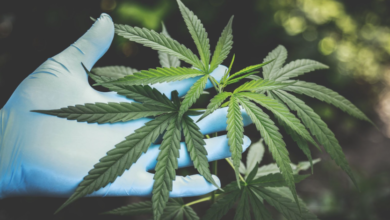Is Cbd Allowed on Planes

As the popularity of CBD continues to rise, many travelers find themselves questioning the legality of bringing these products on flights. While the 2018 Farm Bill provides a framework permitting hemp-derived CBD with less than 0.3% THC, the reality is more nuanced. Varying state regulations and airline policies can complicate matters, leaving travelers at risk of unforeseen complications. Understanding TSA guidelines and how to safely pack your CBD products is crucial—not just for compliance, but for ensuring your journey remains uninterrupted. What nuances should travelers be particularly aware of as they navigate this evolving landscape?
Understanding CBD and Legality
To navigate the complexities of traveling with CBD, it is essential to understand its legal status across different jurisdictions.
Numerous CBD misconceptions can cloud judgment, yet the benefits of CBD, such as relief from anxiety and inflammation, are widely recognized.
Awareness of local laws is crucial to ensure a seamless experience, allowing users to enjoy the advantages of CBD without legal repercussions.
See also: How Long Does Cbd Gummy Effect Last
TSA Regulations on CBD
Understanding TSA regulations regarding CBD is essential for travelers, particularly in relation to the legality of hemp-derived products.
The distinction between carrying CBD in carry-on luggage versus checked baggage can also impact compliance with federal guidelines.
Hemp-Derived CBD Legality
Hemp-derived CBD products are generally permitted on airplanes, provided they contain less than 0.3% THC, in accordance with TSA regulations. This aligns with hemp legality established by the 2018 Farm Bill, which legalized hemp and hemp-derived compounds.
Travelers should remain informed about CBD regulations, as state laws may vary. Ensure your products comply to enjoy a hassle-free journey while embracing personal freedom.
Carry-On Vs. Checked Baggage
Travelers should be aware of specific TSA regulations regarding the placement of CBD products in carry-on versus checked baggage, as these guidelines can impact their flying experience.
CBD products derived from hemp are generally allowed in checked baggage, but carry-on restrictions apply.
Ensure that any CBD oil contains less than 0.3% THC to comply with federal regulations and avoid potential issues at security checkpoints.
State Laws Impacting Travel
Various state laws regarding CBD can significantly influence the ability of individuals to carry these products when flying domestically.
State specific regulations vary widely, creating local enforcement differences that travelers must navigate.
Some states embrace CBD, while others impose restrictions or outright bans.
Understanding these laws is crucial for anyone seeking to maintain their freedom to travel with CBD products.
International Travel Considerations
When planning international travel, it is essential to recognize that regulations surrounding CBD products can differ significantly from one country to another. This often leads to confusion and potential legal issues for unwary travelers.
Ensure you research international regulations thoroughly and verify necessary travel documentation to avoid complications.
Being informed can empower you, enabling a more liberated and enjoyable travel experience without unexpected legal hurdles.
Types of CBD Products Allowed
A range of CBD products may be permitted on planes, contingent upon their THC content and compliance with federal regulations.
Common CBD product types include oils, gummies, and topicals, typically with less than 0.3% THC.
Travelers should adhere to CBD usage guidelines, ensuring all items align with local laws and airline policies, promoting a hassle-free travel experience while maintaining personal wellness.
Carry-On Vs. Checked Baggage
When traveling with CBD products, understanding the distinctions between carry-on and checked baggage is crucial.
TSA regulations play a significant role in determining what is permissible, while state laws may impose additional restrictions.
Furthermore, proper packaging and labeling are essential to ensure compliance and avoid potential issues during your journey.
TSA Regulations Overview
Understanding the TSA regulations regarding CBD is essential for travelers, as the rules differ significantly between carry-on and checked baggage.
While TSA enforcement practices allow certain hemp-derived CBD product types in checked luggage, carry-on restrictions are more stringent.
Travelers should ensure their CBD products comply with federal regulations, maintaining a THC content of 0.3% or less to avoid complications.
State Laws Considerations
State laws regarding CBD can frequently complicate what travelers are allowed to carry on planes, particularly when distinguishing between carry-on and checked baggage.
Travelers must navigate state-specific regulations, as some states may permit CBD while others may impose restrictions.
Local enforcement practices can vary significantly, potentially leading to legal issues for those unaware of the differing laws across states.
Always verify regulations before traveling.
Packaging and Labeling Requirements
Proper packaging and labeling of CBD products are essential for travelers to ensure compliance with airline regulations and to avoid potential legal complications during air travel.
Adhering to specific packaging requirements, such as using child-resistant containers, and meeting labeling standards, including ingredient disclosure, can facilitate smoother transit.
Whether in carry-on or checked baggage, clarity in presentation is vital for hassle-free journeys.
How to Pack CBD Safely
When preparing to travel with CBD products, it is essential to consider both legal regulations and packaging methods to ensure a hassle-free experience.
Utilize CBD storage tips such as airtight containers to preserve potency and prevent leaks.
Additionally, invest in CBD travel accessories like padded cases for protection.
Proper packing not only safeguards your products but also enhances convenience during your journey.
Potential Risks of Traveling With CBD
Traveling with CBD can present various risks, including potential legal complications and misunderstandings regarding product legality at different destinations.
Adhering to CBD travel guidelines is essential to mitigate these risks.
Additionally, ensuring CBD product safety from contamination or incorrect labeling is crucial for travelers.
Awareness of local laws and regulations enhances your freedom to enjoy CBD while traveling with minimal concerns.
What to Do If Stopped
If stopped while carrying CBD products, it is crucial to remain calm and informed about your rights and the applicable regulations, as this can significantly influence the outcome of the situation.
Be aware of potential legal consequences and share traveler experiences to advocate for your case.
Understanding the nuances of CBD legality can empower you to navigate these encounters more effectively.
Tips for a Smooth Journey
To ensure a smooth journey while carrying CBD products, travelers should familiarize themselves with airline policies and state regulations regarding the transportation of such items.
Additionally, it’s crucial to debunk common CBD myths, as misinformation can lead to unnecessary complications.
Conclusion
In a world where the legality of hemp-derived CBD can spark more confusion than a game of charades, travelers must navigate a labyrinth of regulations, state laws, and airline policies akin to a high-stakes escape room.
While TSA allows CBD under certain conditions, the unpredictability of human interpretation and varying state laws can turn a simple journey into a comedic adventure.
Ultimately, preparation and awareness are essential, lest one finds themselves in an unintended debate over the merits of cannabinoids at 30,000 feet.




